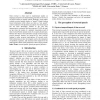Free Online Productivity Tools
i2Speak
i2Symbol
i2OCR
iTex2Img
iWeb2Print
iWeb2Shot
i2Type
iPdf2Split
iPdf2Merge
i2Bopomofo
i2Arabic
i2Style
i2Image
i2PDF
iLatex2Rtf
Sci2ools
INTERSPEECH
2010
2010
2010, a speech oddity: phonetic transcription of reversed speech
Time reversal is often used in experimental studies on language perception and understanding, but little is known on its precise impact on speech sounds. Strikingly, some studies consider reversed speech chunks as "speech" stimuli lacking lexical information while others use them as "non speech" control conditions. The phonetic perception of reversed speech has not been thoroughly studied so far, and only impressionistic evaluation has been proposed. To fill this gap, we give here the results of a phonetic transcription task of time-reversed French pseudo-words by 4 expert phoneticians. Results show that for most phonemes (except unvoiced stops), several phonetic features are preserved by time reversal, leading to rather accurate transcriptions of reversed words. Other phenomena are also investigated, such as the emergence of epenthetic segments, and discussed with insight from the neurocognitive bases of the perception of time-varying sounds.
INTERSPEECH 2010 | Phonetic Transcription Task | Signal Processing | Time Reversal | Time-reversed French Pseudo-words |
Related Content
| Added | 18 May 2011 |
| Updated | 18 May 2011 |
| Type | Journal |
| Year | 2010 |
| Where | INTERSPEECH |
| Authors | François Pellegrino, Emmanuel Ferragne, Fanny Meunier |
Comments (0)

